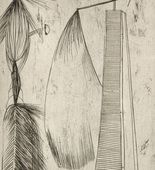
Cat. No. 512/V
Pivotage Difficile
- State/Variant:
- State V of VI
- Date:
- 1947
- Themes
- Abstraction, Architecture, Figures, Objects
- Techniques
- Engraving
- Support:
- Smooth, wove paper
- Dimensions:
- plate: 6 7/8 x 4 15/16" (17.4 x 12.6 cm); sheet: 9 13/16 x 6 11/16" (25 x 17 cm)
- Signature:
- "Louise Bourgeois" lower right margin, pencil; "1947" lower left margin, pencil.
- Publisher
- unpublished
- Printer
- The artist at Atelier 17
- Edition:
- 1 known impression of state V
- Edition Information:
- Not issued as a published edition at any state.
- Impression:
- Not numbered
- Curatorial Remarks:
- The fragments of brown tape visible around the edges of this print appear to have been applied for the purpose of flattening the print as it dried.
In the second half of the 1940s, Bourgeois spent time at Atelier 17, the print workshop of Stanley William Hayter. The workshop had transferred operations from Paris to New York during the war years. It is not known precisely which prints she made at the workshop since she also worked at home on a small press. The designation of “the artist at Atelier 17” as printer means that the impression was likely made at the workshop. The designation is based on dates, inscriptions, techniques favored at Atelier 17, and/or stylistic similarities to images in the illustrated book “He Disappeared into Complete Silence,” which the artist repeatedly cited as having been made at Atelier 17. It is also possible that Bourgeois worked on certain plates both at home and at the workshop, or pulled impressions at both places. - Former Cat. No.:
- W & S 42
- Descriptive Title:
- English translation: "Difficult Steering"
- Description:
- Engraving, with scorper
- State Changes and Additions:
- Changes from state IV, by scorper: upper center oval gauged out.
Changes from state IV, in engraving: hair added to left figure; shading added to right side of center right structure; horizon line delineated. - Artist’s Remarks:
- During an interview for the 1994 catalogue, "The Prints of Louise Bourgeois," the artist pointed to the firm support of the base of the structure at the right. "It is anchored to the bottom." In her wood sculptures of the period, the vulnerability that Bourgeois generally felt merged with the fear that her pieces literally would fall over. In the case of the structure here, Bourgeois believed that problem is solved.
"I still feel a lack of support today," she continued. "I still need to create my own support." Again, Bourgeois joined the notions of emotional and physical support. "But," she said, "you can take precautions and the fear disappears." The imagery in her prints "is not an illustration of the fear, but an exorcism of it." She characterized her fears about support as "realistic," describing her need for railings around her garden and the fact that the banisters in her house have been held onto so vigorously they now "shake and creek and must be reinforced." She often pointed to the hair depicted in her prints as a source of support. Looking at the leftmost figure that becomes fully apparent beginning with state III, and that progressively becomes covered by hair, Bourgeois responded to the change: "She is much more pleased with herself. She is now completely secure; she is as pleased as Punch."
(Quote cited in Wye, Deborah and Carol Smith. "The Prints of Louise Bourgeois." New York: The Museum of Modern Art, 1994, p. 102.) - MoMA Credit Line:
- Gift of the artist
- MoMA Accession Number:
- 135.1990.4

1947
Pivotage Difficile
1946-1947
Related Works in the Catalogue
Related Works in Other Mediums


Untitled
1947

Untitled
1947
Medium: Ink and charcoal on paper
Dimensions: sheet: 11 x 7 1/2" (27.9 x 19.1 cm)
© The Easton Foundation/VAGA at ARS, NY


Untitled
1947

Untitled
1947
Medium: Ink on paper
Dimensions: sheet: 11 x 7 1/2" (27.9 x 19.1 cm)
© The Easton Foundation/VAGA at ARS, NY


Untitled
1947

Untitled
1947
Medium: Ink on paper
Dimensions: sheet: 13 1/4 x 10" (33.7 x 25.4 cm)
© The Easton Foundation/VAGA at ARS, NY


Untitled
1948

Untitled
1948
Medium: Ink and pencil on paper
Dimensions: sheet: 11 1/8 x 7 1/2" (28.3 x 19.1 cm)
© The Easton Foundation/VAGA at ARS, NY


Memling Dawn
1951

Memling Dawn
1951
Medium: Wood, paint, and stainless steel
Dimensions: overall: 67 1/4 x 15 x 15" (170.8 x 38.1 x 38.1 cm)
© The Easton Foundation/VAGA at ARS, NY


Figure
1954

Figure
1954
Medium: Wood, paint, stainless steel, and nails
Dimensions: 47 1/4 x 12 x 12" (120 x 30.6 x 30.6 cm)
© The Easton Foundation/VAGA at ARS, NY


















